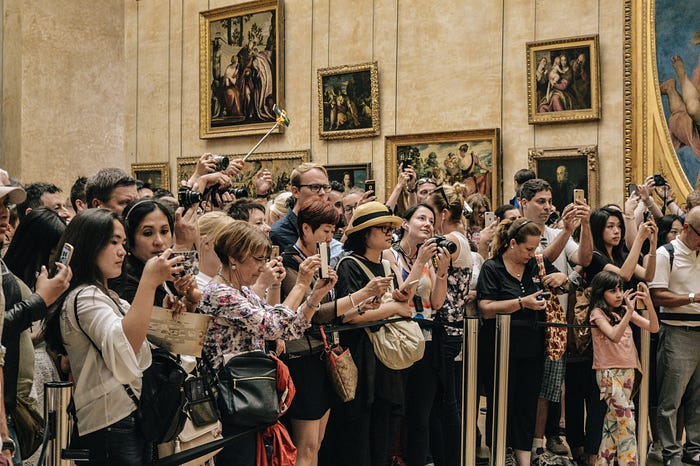(This is Part 2 of a series on fame, but each part stands alone. | Part 1 | Part 3 | Interlude | Part 4 | Part 5 | Part 6 | Postlude)
My interest in fame is partly because I don’t want it, but it is something other people seem to really want.
Social scientists do study the desire for fame. This 2013 Scientific American article recounts a study that found the desire to be seen/valued is the primary motivation people give for wanting fame. Other reasons include a desire for the wealthy lifestyle/social status we associate with fame and, in people with less narcissistic tendencies, a desire to help others or make others proud.
The desire to be valued is considered by some to be a universal human need. However, the article above distinguishes between a need to belong with a need to relate, with the latter being associated with people who are less narcissistic and less anxious about social exclusion. So, there may be a correlation with wanting fame and narcissism, but that isn’t the only reason why people want fame.
All this said, not everyone who wants fame gets it (and vice versa). So who gets to be famous? I think it helps to start with a different question: What exactly is fame?
The concept of celebrity is actually a pretty old one. How old depends on who you ask.
Columbia University professor Sharon Marcus, in her 2019 book The Drama of Celebrity, explains that the word “fame” dates back to the Romans — fama, meaning great deeds that would be remembered. In this interview, she points to politicians, performers, and athletes as the early celebrities in Europe. She also draws a distinction between fame back then, when people wanted to be remembered in their death, and celebrity now, when people want to be valued in their life.
In his 2020 book, Dead Famous: An Unexpected History of Celebrity from Bronze Age to Silver Screen, British historian Greg Jenner lists Henry Sacheverell, an Anglican clergyman, as the first example of a celebrity as we know it. He became famous in 1709 for a November 5 sermon that got him impeached by the House of Commons. Jenner uses this definition: “Celebrity (noun): A unique persona made widely known to the public via media coverage, and whose life is publicly consumed as dramatic entertainment, and whose commercial brand is made profitable for those who exploit their popularity, and perhaps also for themselves.”
I think this definition is a good starting point for answering my question about who gets to be famous.

Answer 1.
I’m pretty sure that “commercial brand” wasn’t a ubiquitous phrase when I was growing up, but it comes up a lot in the 21st century. I’ve had webinars and seminars advertised to me about “building my brand.” (I don’t have a brand. I am a copyeditor.)
Celebrity branding is a marketing strategy that also dates back a lot further than you might think. Wedgwood china used an endorsement from Queen Charlotte as a marketing device in the 1760s to sell their “Queen’s ware.” Trading cards with images of celebrities on them were used in product packaging in the 1800s.
Celebrity branding is quite common in some Asian countries (Japan, South Korea, China, Thailand, and India are the top five). In Japan, more than half of all ads contain a celebrity. If you dig into it a little, you can find celebrity influence rankings/brand valuations in these countries that factor in things like search engine hits, media activity/exposure, and commercial value. Forbes China publishes an annual list of the most influential celebrities. The Korea Institute of Corporate Reputation provides data-based monthly brand reputation rankings of K-pop groups. According to the 2020 Duff and Phelps brand valuation study, Virat Kohli (for you non-cricket fans, he’s one of the best batsmen in the world) has led the ranks in India for the last four years.
In the US, it’s more common to see athletes do commercial product endorsements than other celebrities. Babe Ruth may have started it, but by 1989, 75% of all sports-related products were endorsed by a celebrity. There are no celebrity brand rankings in the US that I know of, but there is the Forbes list, which ranks celebrities worldwide by earnings. The top spot in 2020 went to Kylie Jenner, partly because she sold 51% of her cosmetics company, but half of the top ten were athletes (Roger Federer, Cristiano Ronaldo, Lionel Messi, Neymar, and LeBron James).
So part of my answer is that the people who get to be famous are those who can make people rich (including themselves but not always). This doesn’t seem like it matches the main reason people give for wanting fame (to be seen/loved), but it does match the lifestyle aim, as money is inextricably intertwined with fame and social status is inextricably tied with money.

Answer 2.
But “earning power” still doesn’t explain who gets to be famous. If you look at these lists from around the world, the main categories of jobs that the valuable celebrities have are: athlete, actor, singer/performer/idol, and Kardashian. But also celebrity chefs, TV personalities, and whatever the hell Rush Limbaugh does.
Just being rich is also a reason why some people are famous. The most money is made in industries like financial services, tech, pharmaceuticals, and commercial real estate. Those people generally aren’t famous unless they’re unhinged grifters who get elected president of the United States or they’re shooting themselves up into the air on rockets. (Narcissism? Check!) These people act as though we should care about them, but I’m going to set them aside for now.
When I think of celebrities, I think of people who intentionally entertain us in some way.
Entertainment is part of what the media covers, as purveyors of information. Today, the media has been condensed into a handful of conglomerates that own multiple companies in multiple industries (movie production, network TV/cable channels [including sports channels], news operations, audio/music, publishing, video games, telecommunications, etc.). This means, effectively, that news and entertainment have merged, and in the profit-driven, Murdochian hellscape of an economy we live in, clicks matter more than quality of content. So our media (news and entertainment) is both sensationalist to get the click but also predictable to get the steady, repeat customer, and most of the content ultimately serves corporate (and sometimes state and military) interests and feels like propaganda or advertising. I do have the Big 6 US media conglomerates in mind here, but other countries have similar large media conglomerates, too — Japan, Brazil, Germany, the UK, China, France, etc.
Before you think I’m being too cynical, I do think entertaining requires skill, training, and practice (even I can admit that TV presenting and radio hosting are skills). Actors often go to school for acting. Athletes often train from childhood. Singers train their voices or learn how to play instruments or write songs. These are crafts that people learn and hone. They have to be kept up through conditioning, rehearsal, and work. And ultimately, entertainers of these sorts still sell their labor, which puts them in a strange position of being among the very few people who can get rich off a salary alone.
I hesitate to call someone who makes a million dollars per episode of a TV show or $100K per basketball game a worker, because they certainly aren’t working class in the tax bracket sense. But they don’t typically own the means of production and aren’t directly exploiting other people’s labor (even if the larger industry they’re in does) unless they have hired staff they mistreat. Not to mention, most professional athletes, actors, and musicians aren’t famous and don’t even make enough money to live on. (It’s almost impossible for musicians to make a living, for example, and they certainly don’t make money off people listening to their music.)
So maybe working hard is a factor in who becomes famous. It certainly fits the narratives we always hear about work. In the US in particular, we fetishize work (while hating workers — not to mention that this fixation on “work” is ableist from the jump). We don’t take time off (if we’re lucky enough to get it), we’re expected to be on email constantly or have open availability, we boast about hours put in even though I’m pretty sure most of us are miserable.
But to be famous anywhere, you have to keep yourself in people’s minds. You have to “provide content.” One way to do that is to work a lot. When I think about a hard-working famous person, I think about Wang Yibo, a Chinese entertainer, who started out as an idol (the main dancer of UNIQ), but now acts in dramas, is currently a TV host on one show and a dance captain on another, is a professional motorcycle racer, and is the spokesperson or brand ambassador for more than 30 brands, including KFC, Shu Uemura, and Chanel. He’s also on magazine covers a lot. I’m pretty sure he has figured out how to hack time itself and works 25 hours a day while the rest of us sleep. And he’s only number 9 on the list from Forbes China I linked above.
We do see celebrities jetting off to Ibiza and singing “Imagine” from their luxury homes during a pandemic, but many of them do work and work hard, it’s just not shift work or 9-to-5 work. And some of it actually looks like fun work to us peons, along with plenty of perks. But I know personally that I simply have never had the mind/body combination to do the work it takes to be a pop star or a professional tennis player — even if that was something I wanted.
But not everyone who sells products and works hard in a media-friendly industry becomes famous. So there has to be something else.

Answer 3.
It seems to me that to be a celebrity, you have to stand out from your peers in some way. You don’t have to be the “best” or to win awards/championships, though that helps. But you do have to be consumable and engaging with the press. Part of that might just be charisma, a je ne sais quoi, something you can’t really work for beyond “media training.” But part of that is also to be “acceptable” within norms that the media industry has established and that fit with general societal norms, which narrows greatly who gets to be famous.
Athletes who are very good at popular sports and win a lot are primed for fame, so long as the news media (with all of its gender and racial/ethnic biases) likes them. But what about in creative industries? You have to stand out, but when you’re marketed like a product and have to promote projects that many people worked on, there are limitations to this. We as humans like people to fit into categories (what is called social categorization). And when it comes to famous people, those categories include certain beauty standards (which is another place where you run into racism, colorism, anti-fatness), sexualities and genders (more potential for bigotry here, too), behavioral norms within genders (leading to sexism, misogynoir, etc.), and even relationship statuses (this one varies globally). And that’s not even taking into account that their work — albums, songs, films, tv shows — must also be palatable.
At least some norms are required for any society to function, but celebrities worldwide seem to really have to stay within them, maybe even more than the rest of us feel pressured to do. Of course, not all people who act or play a sport or write music want to be famous. Some actors remain in the theater or won’t take blockbuster roles because they don’t like Hollywood. Pearl Jam pulled back from doing press and then refused to cave to Ticketmaster and voluntarily lost a lot of their early ’90s fame.
There are established paths in the entertainment industry, ways to behave, “important” people to please, norms to follow. People rarely push boundaries beyond surface level gimmicks — which is why what Lil Nas X is doing is worth noting. He put it best in a tweet: “you seem to only respect gay artists when the gay part is tucked away. you don’t like me because i embrace my sexuality instead of hiding it and never speaking on it for your comfort.“
When people talk about representation in media, they frequently talk about the value of people seeing themselves. And that is important. It feels good when you can relate to someone in a positive way, especially for things that have made you feel different in a negative way. But we need more than that substantively. We need to break with practices of normalization that try to make us all the same and feel bad about ourselves when we don’t, not just through the people we see but the stories that are told (and the way they are told). Frankly, I’m skeptical that this can genuinely be done in an industry that is entrenched in a dehumanizing economic system that relies on racialized, gendered, and abled social stratification.
And if representation is rare, then confronting norms is even rarer. A lot of famous actors and actresses and pop stars look exactly alike to me (to be fair, I have prosopagnosia), and I feel like I see the same movie over and over and hear the same songs.
Not only do norms constrain, celebrities don’t make themselves famous (even the ones who feel entitled to it — Jeff Bezos’s “space” flight got almost as much network media coverage in a day as climate change has gotten all year). Regardless of what Ben Stiller says, there is cronyism and nepotism in the media industries. There’s access. At the very least, there is intergenerational knowledge of how the industry works, which is often why children do the same work as their parents in any industry. It’s hard to be a first-generation anything.
There is also a lot of help — managers, publicists, stylists, makeup artists, hair stylists, creative teams, producers, sound engineers, directors, coaches, trainers, and others.
Fame in the 21st century is intertwined with capitalism, which is intertwined with the pervasive liberalist idea of the individual. (And even societies that aren’t centered on the extreme individualism of the US have famous people.) So the individual gets to be famous even if they are a result of many people’s work and how well they fit into social norms.
I’m not sure any of this is a satisfactory answer to my question.
I imagine many people consider fame to be a mark of “success.” But it turns out that when you’re famous, your worth is in your earning power. And though fame may involve the cultivation of a skill or a craft, you also have to fit into preconceived norms, look a certain way, act in a way that’s “media friendly.” You have to sell yourself.
And though I do think this might meet the aim of being seen, I’m not sure any of this amounts to feeling valued.
